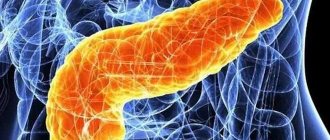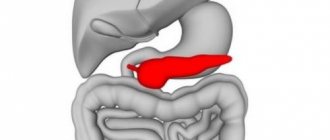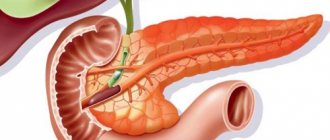Psychosomatics of pancreatitis
The pancreas produces substances necessary for digesting food, as well as hormones for the endocrine system.
One of them is the well-known insulin, which is designed to control blood glucose levels. Let us briefly consider diseases of the pancreas. Probably the most common ailment of this organ is pancreatitis (inflammation of the pancreas). It occurs in acute and chronic types.
The following physical factors influencing the occurrence of pancreatitis are distinguished:
- pathology of the gastrointestinal tract,
- blockage of the bile ducts in the pancreas,
- infection,
- pancreas injury,
- disorders in the cardiovascular system,
- metabolic or hormonal disorders,
- unhealthy diet
- allergens,
- medical drugs,
- alcohol intoxication.
Symptoms of pancreatitis (both types) are: increased gas production with impaired stool regularity, nausea, vomiting without a feeling of relief, heaviness in the stomach, rapid heartbeat, shortness of breath, weakness and malaise, pain in the hypochondrium.
We emphasize that the seriousness and danger of pancreatitis lies in the fact that the changes occurring in the pancreas are irreversible.
The next disease of the pancreas is diabetes. Here, type 1 diabetes is distinguished - when the human immune system destroys the cells of the pancreas that produce insulin. A person has to constantly inject insulin from outside to control blood sugar levels - he becomes insulin dependent.
Type 2 diabetes is characterized by the fact that the pancreas is forced to produce a lot of insulin, since it does not cope with its tasks of influencing the body's cells (cells become resistant to insulin - this is called insulin resistance). At the same time, the level of glucose in a person’s blood also increases, and he takes glucose-lowering drugs.
In medicine, a genetic disorder of the pancreas is diagnosed as cystic fibrosis.
Islet cell tumor is a disease of the pancreas characterized by a benign or malignant tumor of the so-called islet cells (clusters of endocrine cells that produce hormones). As a rule, the physical cause of this disease is advanced pancreatitis.
What is psychosomatics?
Surely each of us has heard the mysterious word “psychosomatics” at least once in our lives. It’s not for nothing that people have the opinion: “All diseases come from nerves.” There is a deal of truth in it.
From a psychological and medical point of view, psychosomatics is the relationship between our emotional state (anger, fear, prohibition of expressing feelings) and a person’s physical well-being (disease).
Psychosomatic diseases are diseases of our body that are caused by prolonged emotional experience and stress.
Today, almost every doctor pays attention to the psychological factor of the disease. In case of ineffectiveness of medications, the reasons are sought at the psychological level. There are a number of symptoms of psychosomatic illness, that is, the development of the disease due to negative emotions:
- feeling of discomfort in the chest, throat or stomach;
- a feeling of “squeezing” in the heart, disruption of its rhythm and even short-term freezing;
- heaviness in the stomach, spasm and constant feeling of hunger;
- constipation and weakness are possible;
- exacerbation of skin disease;
- autoimmune process: rheumatoid arthritis, cancer, etc.;
- increased anxiety, panic attack;
- musculoskeletal problem: early osteochondrosis, curvature of the spine, muscle spasms in the back, numbness of the limbs.
Factors influencing the development of psychosomatic diseases:
- Inability to experience (show) your emotions. Such suppression of internal emotions leads to the fact that a person forbids himself to express them. He has no internal resolution to the conflict. If a person has emotions, but does not allow or cannot “throw them out”, this does not mean that he does not have them. They go to a deep level, thereby giving rise to the development of a psychosomatic illness.
- Psychological trauma of childhood.
- Severe stress.
During shocks, the human body produces special biologically active substances that affect all organs in the body.
Psychosomatics of the pancreas
To reveal the psychosomatics of this organ, let us remember that it is involved in the digestion of food. Namely, it helps complete the digestion process: its enzymes break down nutrients into proteins, fats and carbohydrates.
We already know that the digestion of food according to Louise Hay and Liz Burbo symbolizes the digestion of information coming to a person from the surrounding World.
This means that the work of the pancreas on the metaphysical plane symbolizes the splitting of informational food: putting knowledge, emotions and desires on shelves, as well as drawing conclusions.
The second function of this organ, the production of insulin, which controls sugar, also helps to understand the psychosomatic causes of diabetes: it symbolizes how a person relates to the sweetness (sugar) of life.
The first type of diabetes (when the immune system destroys its own cells) indicates that there is an internal struggle (in the human soul). This person, as a rule, is weak-willed, cannot control his desires and weaknesses himself and overindulges them (therefore, outside control is needed).
The second type of diabetes (which mainly affects older people) indicates that a person does not feel the sweetness (joy) of life, does not know how to see them, does not know how to enjoy life, since he is convinced that there are no joys left.
Mission "Save the world" is impossible
The psychosomatics of pancreatic diseases has its own “iron” face. Psychology claims that it is possible to create a psychological portrait of people prone to such a disease. Usually these are active people, strong in spirit, they are smart and purposeful. Constant work, plans and ways to implement them are raging in their heads. In addition, such people must control everything around them and take care of everyone.
However, behind the increased external activity, sadness is often hidden, because due to the desire to appear strong, they do not receive enough love and affection.
One of the functions of the pancreas is to complete the process of digesting food, synthesizing it into proteins, fats and carbohydrates. Pancreatitis often occurs in people who do not finish what they start.
Psychosomatics is of particular importance. The pancreas gives a signal that you need to die your ardor. It is impossible to make everyone around you happy. Naturally, you shouldn’t turn into an egoist, but the desire to control everyone and everything needs to be reduced a little.
If the pancreas hurts, psychosomatics plays an important role here along with biological factors. In this case, what happens:
- metabolic disease;
- hormonal imbalances;
- wrong diet.
However, it is worth paying attention to the psychological aspect of the problem. Every second of us is literally “seized” by stress.
Due to the current stress phenomenon, a person cannot realize that he is overeating, especially sweet and fatty foods.
Among the pronounced symptoms are the following:
- abdominal pain (in the left hypochondrium);
- pain in the left side of the back (in the area of the shoulder blade);
- nausea;
- vomit;
- decreased appetite;
- weight loss.
The pain may be constant or may occur in attacks. After overeating spicy, fried and fatty foods, the pain syndrome may intensify.
In case of inflammation of the pancreas, in no case should everything be attributed solely to psychosomatics. Pancreatic diseases must be treated. First of all, you need to consult a general practitioner.
After this, you need to undergo a series of diagnostic examinations and pass the necessary tests. If inflammation of the pancreas and the psychosomatics of the disease are put on hold, we are talking about hospitalization of the patient.
In order for the chronic form of pancreatitis of a psychosomatic nature not to manifest itself, it is necessary:
- seek help from a psychologist who specializes in psychosomatic diseases;
- undergo acupuncture and speleotherapy - methods that can be very effective;
- contacting a psychotherapist (in addition to psychological ways to solve the problem, he will prescribe a number of medications, including antidepressants).
Psychological causes of pancreatic diseases
Let's take a closer look at what negative psycho-emotional experiences cause pancreatitis and other pathologies of the pancreas.
- The first reason: a person wants everyone to feel good, he cares about everyone, plans for everyone, wants to provide for everything. Such a person outwardly appears strong, active, and purposeful. But behind all this intense activity, as a rule, there is a deep sadness hidden due to an unsatisfied thirst for love and affection.
- The second reason lies in the feeling of rejection. Basically, this feeling arises in childhood: when basic emotional needs (for love, affection, protection) were not satisfied and the child felt rejected. Or a person may still suffer from not being recognized by his father. All this is superimposed on a person’s state during times of stress, and he feels a lack of inner strength in order to make his life joyful.
- A deficiency of self-love, as a cause of pancreatitis, follows from the previous one: a person who has not experienced self-love from loved ones, as a rule, does not know how to love himself and does not know how to love or express love for others (simply because he has not seen and does not know what it is - love). Such people usually find it difficult not only to give love to others, but also to accept it (assimilate it as a nutrient).
- The next reason is associated with such destructive emotions as anger and conviction that life is unfair. Let us ask again: where do our beliefs come from? Yes, many are from childhood. Psycho-emotional childhood traumas often form negative beliefs and attitudes for life.
PANCREATITIS and PSYCHOSOMATICS
For the pancreas to function properly, it cannot be overloaded with too “fat” expectations, overly sweet desires and half-digested information, because a sense of proportion is important not only in food, but also in other areas of our lives.
The pancreas is an important organ involved in the digestion process and the functioning of the human endocrine system. That is why dysfunction of this organ, or its inflammation, which experts call pancreatitis, is a very serious disorder that entails many other problems.
Treatment
In case of inflammation of the pancreas, in no case should everything be attributed solely to psychosomatics. Pancreatic diseases must be treated. First of all, you need to consult a general practitioner.
After this, you need to undergo a series of diagnostic examinations and pass the necessary tests. If inflammation of the pancreas and the psychosomatics of the disease are put on hold, we are talking about hospitalization of the patient.
In order for the chronic form of pancreatitis of a psychosomatic nature not to manifest itself, it is necessary:
- seek help from a psychologist who specializes in psychosomatic diseases;
- undergo acupuncture and speleotherapy - methods that can be very effective;
- contacting a psychotherapist (in addition to psychological ways to solve the problem, he will prescribe a number of medications, including antidepressants).
Psychosomatics of pancreatitis
- "Iron" psychology
- The mission is to save the world?
Pancreatitis is also dangerous because if treatment is not started after the first acute attacks, it can very quickly become chronic. That is, if you often feel aversion to food, pain in the hypochondrium, nausea and heaviness in the stomach, it would be useful to consult a doctor and also think about the possible psychological causes of pancreatitis.
"Iron" psychology
According to psychosomatics, pancreatitis has its own “face”; that is, there is a certain psychological portrait of people who are prone to pancreatic diseases. Usually these are strong, smart, active people who want a lot from life, constantly hatch different plans and think about their implementation. In addition, they strive to control everything around them and try to take care of all their loved ones, blaming themselves for all their problems and troubles.
However, behind all this activity and hypertrophied care lies deep sadness , since due to their desire to appear strong and independent, such people often do not receive their share of love, affection and care. Another function of the pancreas is to complete the process of digesting food, that is, to synthesize it into proteins, fats and carbohydrates. That is, ancreatitis occurs in those who do not complete the process of digesting information that a person receives from the outside.
This may mean that you think about everything that happens to you, but do not draw the necessary conclusions from the situations that arise. As a result, the information is not transformed into the necessary experience, loses its freshness and begins to poison the pancreas.
The mission is to save the world?
To reduce the manifestations of pancreatitis and eliminate attacks, you need to give up the desire to make everyone around you happy. Of course, this does not mean that you should turn into an inveterate egoist and stop worrying or caring about your loved ones, but you should not try to completely control their lives.
Also try to moderate your determination a little. Remember that in addition to the future, there is also the present, which can be no less bright and joyful if you relax and rest a little.
In general, for the pancreas to function properly, it cannot be overloaded with too “fat” expectations, overly sweet desires and half-digested information , because a sense of proportion is important not only in food, but also in other areas of our life. published by econet.ru.
PS And remember, just by changing your consciousness, we are changing the world together! © econet
Did you like the article? Then support us, click
:
Psychological portrait of the patient
A person prone to pancreatic diseases is distinguished by high intelligence, strong character, activity, and assertiveness. This is an ambitious person, constantly in action, planning something, and not used to putting off problems until a later date.
Such a person is suspicious; it is extremely important for him to keep life circumstances under control. If control is impossible, then nervous disorders develop. The patient cares fanatically about his loved ones. If something doesn’t work out for them, problems arise, then he places the blame and responsibility on himself.
But such fanaticism and activity are only the outer shell of true nature. In reality, the patient is sad, moping, and in dire need of care and tenderness.
Psychological causes of pancreatic diseases
Physiological factors that lead to the formation of pancreatic disease include:
- cholelithiasis;
- osteochondrosis;
- stomach ulcer;
- excessive intake of fatty, sweet foods, alcohol;
- traumatization;
- diseases of the circulatory system.
Psychosomatics considers all diseases as the result of a negative attitude in the patient’s mind. There is a statement to this from supporters of the psychosomatic approach that pathologies develop due to a negative attitude, constant stress, low self-esteem, and the nature of the individual.
It is these human states that create such conditions that external causes are able to break through a person’s protective barrier.
Causes of pancreatic psychosomatics:
- low self-esteem - in case of self-dislike and low self-esteem, the pancreas, as well as the organs of the gastrointestinal tract, react sharply to this. This often happens due to abnormal development of society. Such people appear indecisive, they are suspicious, and some doubts appear all the time. Psychosomatics in confusion is also observed in professionalism, love affairs, life intentions;
- desire to control everything - when a person strives to control himself and his environment all the time, stress occurs in the nervous system. Constantly wondering whether the assignment will be completed, as well as watching how other people behave. All these thoughts strain the mind;
- discord in the family - psychosomatic problems of the pancreas, like other diseases, often develop as a result of conflict situations in the family. The cause of psychosomatics is trauma in the child’s psyche, domestic violence, conflict situations between adults, parents and children. Over the years, negative emotions accumulate, so excitability results in pancreatitis. The child is also capable of experiencing inflammation of the gland. Children's health is a reflection of the psychological situation in the family. They suffer when parents conflict; because of quarrels, adults do not respond to the child’s requests, therefore the formation of pancreatitis is the only method for a parent to respond to their child;
- the emergence of anger, guilt and shame - these experiences appear infrequently. A person harbors a grudge, accumulates anger, without releasing it. Due to emotional overstrain, the patient may do unpleasant things to other people. This causes him to develop shame, and then guilt for bad deeds appears. When 3 components act together, this leads to the appearance of psychosomatic pancreatitis;
- factor by gender - there is a concept of congenital chronic pancreatitis. This pathology often passes through the family in women. No significant clinical factors were found, but an association with cystic fibrosis is suggested. There is an assumption that a woman experiences strong emotions during the period of bearing a child and they remain with her. Thus, the accumulated negativity is inherited by the baby, and at birth he is diagnosed with congenital inflammation of the gland.
With heredity, the patient experiences symptoms of pancreatitis such as paroxysmal pain that manifests itself throughout the month, nausea, vomiting, weight loss, poisoning, and diarrhea. This pancreatitis leads to strong experiences at the nervous and psychological level. Signs of the disease sharpen the patient’s gaze on his condition, which leads to a vicious circle of psychosomatics - signs of the disease - emotional tension - exacerbation of symptoms of organ damage.
The psychosomatics of pancreatitis provided an opportunity to create an image of a person who is predisposed to the formation of this disease. The disease develops in smart people, strong and proud, who are trying to get to the top in order to make their loved ones and friends happy. Such individuals always control the lives of loved ones. Excessive care often manifests itself due to a person’s unsatisfied desires for care. When a person strives to demonstrate that he is strong and independent, this only makes the situation worse.
With pancreatitis, psychosomatics shows that the disease also affects people who cannot or do not want to complete what they started.
The lack of organization also affects the ability to study information, process and think about it. Pancreatic dysfunction occurs when a person no longer understands information, stops thinking about the past and accumulating the required experience.
The next pathology of the gland is diabetes. Here the disease has 2 types:
- Type 1 diabetes is manifested by the destruction of endocrine gland cells that produce insulin thanks to the immune system. The patient needs to constantly inject glucose to monitor the sugar level in the circulatory system; he becomes dependent on insulin.
- The disease of the second type is characterized by the fact that the organ needs to produce a large amount of glucose, since it is not able to cope with its task of influencing the body’s cells, they become resistant to glucose. There is also an increase in insulin, and to reduce it the patient takes medications.
The psychosomatics of diabetes manifests itself in people who are prone to selflessness. Many are individuals who tend to fulfill all their desires at once. The sense of compassion and justice in such people is quite acute. A person’s desire is for all his acquaintances to bask in all the happy moments in his life.
Psychosomatics identifies the following factors in the formation of diabetes:
- the impossibility of fulfilling desires - the individual learns only to pamper himself, to be able to say refusal to those who are not able to distinguish powerlessness from goodwill. Such individuals are recommended to learn to love life and themselves. Until such people begin to enjoy every moment that is happening at the moment, they will not be able to receive sweets from the outside. Chasing plans and desires leads to the loss of a normal life;
- emotional emptiness - a person becomes sensually tense due to attempts to invent a method to make the people around him happy. Psychosomatics often manifests itself as desires for additional tenderness and care. The patient's problem lies in his inability to directly express his emotions and desires. Due to the lack of tenderness, sadness guarantees emptiness, which is clogged with diabetes.
Psychosomatics are often observed in childhood, when the child suffers from lack of attention and parental indifference. Thus, in order to satisfy one’s need and suppress anger, fatty and sweet foods are consumed. If this is not done, then the accumulated negativity will spill over into the pancreas, breaking its ability to control diabetes. With this position, it is easier to identify why a child develops obesity when fats are not consumed.
It is also possible to develop a pancreatic islet cell tumor, which can have a benign or malignant course. Pancreatitis in an advanced stage is often considered the physical factor of such a disease.
The formation of a malignant pancreatic tumor is formed in the lining cells of the main channel of the organ and in rare cases shows symptoms, as a result of which it is detected at a late stage of its development.
The psychosomatics of a formation on the pancreatic gland represents past grievances that are not released, but, on the contrary, develops them. It happens that education is tied to strong remorse.
The psychosomatics of cancer as a disease of any organ has been associated with a deadly insult for a long time, which is difficult for a person to say goodbye to today. When considering pancreatic cancer, psychosomatics implies grievances that are associated with psychological problems and excessive desires.
What are psychosomatic disorders?
Briefly, these conditions can be described by the phrase “many complaints about nothing.” Such patients tell doctors that they constantly feel unwell, they are bothered by pain, dizziness, a feeling of “lack of air,” and attacks of palpitations. The doctor conducts an examination, and it shows that everything is fine with the patient. And the patient goes to look for another doctor who will examine him more thoroughly.
A psychosomatic disorder is not only fictitious symptoms, it is also certain disorders of thinking and behavior. The person is in a state of maladaptation, “does not know how” to react correctly to stressful situations, and is fixated on the state of his health.
Such disorders also occur in people who have real somatic diseases, including cancer. In such cases, it can be very difficult to distinguish psychosomatic symptoms from “real” ones. The main sign is that the patient’s complaints clearly do not correspond to the severity of his condition or the objective clinical picture. The patient clearly exaggerates the severity of the symptoms, worries too much about his health, and this worry occupies his thoughts for most of the day and takes up a lot of energy. In oncology, such situations are especially difficult, because cancer is a deadly disease, and there really is cause for great concern and panic.
Many cancer patients experience the exact opposite reaction. They tend to ignore their illness and underestimate its seriousness and the importance of immediately starting treatment.
All these problems must be dealt with by specialists. Unfortunately, in Russia psychological assistance to cancer patients is still very poorly developed.
How to cure the pancreas
Before psychotherapeutic influence is applied, a diagnosis is carried out, as a result of which the reason why the pancreas hurts and what diseases of the pancreas contributed to this will be determined.
Differential diagnosis of the pancreas in psychosomatics is carried out by the following doctors:
Initially, they eliminate the symptoms of pancreatic dysfunction that provoked pancreatitis or diabetes. Treatment of the pancreas is carried out by taking medications appropriate to the pathology.
When the somatic condition is stabilized, the patient requires psychotherapy.
How is pancreatic psychosomatics treated? The treatment method will depend on the factor. When internal discord is provoked by family relationships, systemic psychotherapy of the whole family is required. In the case of childhood mental trauma, psychoanalysis or a cognitive-behavioral approach is carried out.
In other situations, treatment of psychosomatic diseases of the pancreas is carried out by:
- hypnosuggestive treatment;
- auto-training;
- Gestalt therapy;
- short-term positive treatment.
Metaphysical meaning of the pancreas
To understand the psychosomatics of pancreatic diseases, you need to remember the main function of the organ - participation in the final stage of digestion, when food particles are divided into proteins, lipids, and carbohydrates.
Consequently, the metaphysical role of the gland is to “digest” information coming from outside. From the point of view of psychosomatics, the pancreas is responsible for the orderly state of thoughts and emotions, the formation of conclusions. Diseases occur when a person’s perception of information is disrupted and control over emotions is lost.
Another function of the gland is the synthesis of insulin, which keeps blood sugar levels under control. Therefore, in psychosomatics, the pancreas is considered responsible for a person’s attitude towards life’s joys (sweet moments).
The main psychosomatic causes of pancreatic diseases:
- desire for total control;
- obsessive desire to make people around you happy;
- greed;
- ignoring emotional impulses;
- suppressed anger;
- lack of tenderness and care.
Psychosomatic causes of pancreatic diseases
The functioning of the endocrine and digestive systems depends on the quality of the pancreas. Psychosomatics considers the pancreas as an organ that suffers due to the emotional experiences of the individual. A person’s carefully hidden need for love and suppression of emotions lead to disruptions in the production of enzymes and hormones necessary for the body.
Common causes of pancreatic diseases
Among the physiological factors leading to the development of pancreatic pathologies are:
- bacterial attacks;
- osteochondrosis;
- cholelithiasis;
- gallbladder diseases;
- abuse of fatty, sweet foods and alcohol;
- injuries;
- stomach ulcer;
- intestinal infections;
- diseases of the circulatory system.
Psychosomatics considers all diseases as the result of negative attitudes in a person’s thoughts. This branch of psychotherapy argues that pathologies develop due to a person’s negative emotions, way of thinking and character. They create the prerequisites for external factors to break through the body’s natural protective barriers.
Pancreatic pathologies have their own group of psychosomatic causes:
- the desire to control everything around;
- the desire to make others absolutely happy;
- greed;
- denial of emotions;
- suppressed anger;
- desire for love and care.
Scientists have been able to prove that a person’s thoughts have a huge impact on the state of his body. Changing the emotional mood and correct formulation of thoughts allows you to forget about pancreatic pathologies for a long time without grueling therapy. Psychosomatics helps to establish control over diabetes and pancreatitis with the help of internal energy.
Psychosomatic causes of pancreatitis
Pancreatitis is characterized by the suddenness of its manifestation and the irreversibility of the changes made. Among the main signs of pathology are:
- Nausea followed by vomiting, after which there is no relief.
- Increased gas formation and irregular bowel movements.
- Chronic weakness and malaise.
- Pain in the hypochondrium.
- Rapid heartbeat accompanied by shortness of breath.
The psychosomatics of pancreatitis made it possible to create a portrait of a person predisposed to the development of the disease. Pathology affects smart, strong, ambitious people who strive to achieve great heights in order to make all their relatives and friends happy. Such people tend to overly control the lives of loved ones. Excessive care and concern are usually caused by an unmet need for love and attention. The desire to show yourself as a strong and independent person only aggravates the situation.
Observations show that pancreatitis also affects people who cannot or do not want to bring things to their logical conclusion. Gradually, the lack of organization affects the ability to assimilate information, process it, and comprehend it. Pancreatitis makes itself felt at the moment when a person stops analyzing information, drawing conclusions from the experience and accumulating the necessary experience.
Factors contributing to the development of diabetes
Diabetes develops in one of two scenarios:
- First type. After damage to the pancreatic cells responsible for producing insulin, a person requires regular injections of this substance to lower blood sugar levels.
- Second type. Non-insulin-dependent pathology.
Diabetes affects people who are prone to altruism. Most patients turn out to be individuals prone to trying to fulfill many of their desires at once. They have a keenly developed sense of justice and compassion. They want every happy moment in their life to be enjoyed by everyone they know. Psychosomatics considers the unreality of desires to be the first reason for the development of diabetes. A person needs to learn to pamper only himself and say “no” to those who do not know how to distinguish kindness from weakness.
Louise Hay recommends that such people learn to love themselves and their lives. They will not be able to receive sweets from the outside until they learn to enjoy the moments that are happening at the present time. Chasing dreams and plans makes it impossible to live.
The second cause of the disease is called emotional emptiness. The emotional stress of trying to figure out a way to make others happier is often caused by a need for extra care and affection. The patient's problem is his inability to openly express his desires. Sadness due to lack of tenderness provides an emptiness that diabetes fills.
This form of pathology most often occurs in children suffering from lack of attention from their parents.
At the same time, Louise Hay points out that a lack of fatherly love much more often leads to diabetes in children.
Luule Viilma argues that pathology can develop due to repressed anger. The more often a person tries to show tact and politely remain silent in response to rudeness that is repeated with enviable consistency, the more he risks. To contain suppressed anger, the body requires the consumption of fatty and sweet foods. If he is denied this, then negative energy will fall on the pancreas, destroying its ability to control sugar metabolism. With this approach, it becomes easier to determine why obesity develops without consuming fat.
Psychosomatic causes of islet cell tumors and pancreatic cancer
Pancreatic cancer usually develops without symptoms. Pathology is discovered by chance during examination or in later stages. Diseases are directly related to the hormonal function of the pancreas. The psychological reasons for persistent hormonal imbalances lie in the lack of skill to cope with one’s greed and anger.
Researchers have found that greed and greed, which a person does not seek to curb, gradually make adjustments to the hormonal function of the body. Advanced cases contribute to the development of cancer of the thyroid, pancreas, and adrenal glands.
Psychosomatics considers a person’s confrontation with the outside world to be a prerequisite for the development of a malignant tumor. Sinelnikov points out in his works that only the active phase of this confrontation is taken into account, causing strong negative emotions in a person, most often anger. Many people have to acutely experience some unpleasant situations in their lives. When this condition is prolonged, there is a possibility of the formation of a malignant tumor.
Pancreatic diseases are caused by the inability to control your emotions and the fear of talking about your feelings with others. Psychosomatic factors contributing to the development of diseases require prevention and treatment at the spiritual and emotional levels. Exposure to chemicals and even herbs provides temporary control of symptoms, but does not eliminate the cause of their occurrence.
The hidden insidiousness of pancreatic psychosomatic diseases.
Aggravated psychosomatics, the pancreas is extremely insidious and deadly.
Content:
Mild pathologies in the functioning of this organ, if ignored, can provoke pancreatitis - an inflammatory disease of the pancreas. There is acute and chronic pancreatitis. The acute form occurs unexpectedly and disappears with proper treatment. The chronic form of this disease is a long-term, sluggish inflammation with periodic exacerbations. Each of these forms, if not properly treated, can lead to serious complications.
The particular seriousness and danger of this disease is that the changes that occur are irreversible, and if the outcome is unfavorable, they can lead to diabetes and more serious pathologies of this organ. It is no longer a secret that this disease may occur due to nervousness. A natural question arises: what emotions, thoughts, feelings, mental traumas contribute to the emergence of this insidious and also very dangerous illness?
Psychosomatics depending on the disease
There are several most common diseases of the pancreas, the psychosomatics of which are worth talking about:
- pancreatitis – chronic or acute inflammation of an organ, accompanied by nausea, excessive gas formation, defecation disorders, heaviness in the abdomen, weakness, tachycardia;
- type I diabetes (insulin dependent) – a pathology in which immune agents destroy gland cells that synthesize insulin;
- type II diabetes (insulin-resistant) is a disease in which gland cells are forced to synthesize insulin in excess, since the body does not perceive it;
- gland cancer, most often the result of ignored pancreatitis.
Psychosomatics of pancreatitis
The causes of pancreatitis can be the following psychosomatic factors:
- A persistent desire to make everyone around you happy. The gland becomes inflamed in a caring, fussy person who tries to please everyone. Those around him believe in his activity, assertiveness, and perseverance, but all these are ostentatious emotions. In reality, a person is overcome by sadness associated with a lack of warmth and affection.
- A feeling of uselessness that comes from childhood. The child experienced a lack of love, did not feel protected next to his parents, and these emotions were consolidated in adulthood and deprived him of the feeling of joy in life. People who have conflicts with their father often suffer from pancreatitis.
- Inability to love. At first, a person does not experience love from his family, and as a result, he himself becomes unable to express love or give it to others. He's not cold and unfeeling, he just doesn't know how to do it.
- Anger because of life's injustice. This emotion is again a consequence of childhood psychological trauma.
Subtleties of psychosomatics of the pancreas in the observations of world authors.
Lise Bourbeau, in her treatise “Your Body Says “Love Yourself!””, states that pancreatitis manifests itself in a person who is overly worried about a recent incident and experiences great rage that his exorbitant expectations have not been fulfilled.
She also clarifies that the disease with pancreatitis is typical for a person who is too worried about his relatives. A person with diabetes has many desires. He is often too impressionable.
Louise Hay. Table of psychosomatics of diseases of the pancreas and stomach.
| Disease | Possible sources. | Affirmations. |
| Pancreas | Symbolizes the “sweets” of life. | My life is heavenly sweet. |
| Pancreatitis | Negation. Anger and hopelessness: life seems to have lost its appeal. | I lovingly approve of myself. I create joy in my life myself. |
| Diabetes | Longing for the unrealized. Huge. need for a controlling observer. Deep grief. There is nothing pleasant left. | This moment is filled with happiness. I'm devouring the sweets of today. |
| Stomach diseases. | Horror. Fear of the new. Lack of ability to learn new things. | Life doesn't harm me. At any moment of the day I learn something new. Everything goes well. |
Table of psychosomatics of the pancreas by Luule Viilma.
| Ailments | Mental trauma | Book | Page no. |
| Pancreatic diseases | Destructive anger towards the opposite sex. Hatred. The desire to do “good” first of all to others because of the fear that the person is not loved. The desire to surpass oneself, selfishness, pride. | "Stay or go." "The warmth of hope." "Pain in Your Heart" | 80-82 310-313 |
| Pancreas irritation | Disagreement regarding orders, prohibitions. | "Pain in Your Heart" | 194 |
| Diabetes | Demanding mutual gratitude from others. Destructive anger towards the opposite sex. Hatred. The desire for others to fill my life with positivity. | "Pain in your heart." "Stay or go." "Warmth of Hope" | 307-309 80-82 97-100 |
Opinion of famous doctors and psychologists
Many domestic and foreign medical specialists are confident in the psychosomatic nature of diseases of internal organs.
Psychosomatics of the pancreas according to Liz Burbo
A well-known Canadian psychologist believes that the psychosomatics of pancreatitis is either strong anxiety due to a recent event, or strong anger due to unfulfilled desires that were obviously difficult to fulfill, or increased personal anxiety.
Diabetics have too many unfulfilled desires. These are overly impressionable people.
Louise Hay's opinion
The famous psychologist created a table of affirmations for each disease - positive phrases that promote recovery when pronounced regularly. Below are psychosomatic factors that influence the occurrence of pathologies of the pancreas, as well as corresponding affirmations.
| disease | cause | affirmations |
| pancreatitis | anger, worry, despair, uninteresting life | I love and justify myself. I create my own happiness in my life. |
| type 1 diabetes | sadness due to unfulfillment, lack of pleasant events, sad state, inability to control oneself | Every moment is happy. I am filled with the sweetness of this day. |
| type II diabetes | lack of “sweetness” in life | My life is sweet, like heaven. |
| other diseases | fear, unwillingness to perceive and “digest” new things | Life doesn't harm me. Every moment I learn something new. Everything is fine. |
Opinion of Sergei Konovalov
Dr. Konovalov in his work “Energy Information Medicine” calls hidden sadness the psychosomatics of pancreatic diseases.
Psychosomatics of pancreatitis is a categorical rejection of a certain person or event. Inflammation of the pancreas is provoked by anger and despair, a feeling of joylessness of existence.
You become diabetic when:
- despair because of an unfulfilled desire;
- do not know how to receive and give love;
- are deeply saddened.
Bodo Baginski and Sharamon Shalila
Famous meditation experts in their bestseller “Reiki” noted that the psychosomatics of diabetes is the inability to accept love. The body is desalinated. A person begins to suffer from a lack of joys that make life sweet. He strives for love, but can no longer accept it or give it.
Folk recipes for pancreatitis, psychosomatics of the pancreas.
- Thoroughly wash the oats with water. Let it brew for a day. Dry and use a coffee grinder to grind until sandy. Pour the resulting raw material with water. Boil for a couple of minutes. Let it brew for about twenty minutes. Strain, refrigerate and take daily. Use only fresh.
- Squeeze the juice from 2-3 potatoes . Drink fresh 3-4 times a day 10-15 minutes before meals.
- Pour 300 ml boiling water, a mixture of 2 tbsp chamomile flowers, 3 tbsp. l. immortelle, 1 tbsp. l wormwood . Take half a glass of chilled infusion, six times a day.
An aggravated, dangerous psychosomatic pancreas has a direct connection with the patient’s psycho-emotional state, his negative emotions and mental trauma. Accordingly, maintaining hygiene of emotions and thoughts, controlling your feelings will help you avoid such painful and dangerous diseases. If you have already suffered from these ailments, and medical treatment does not bring the expected effect, do not despair. Using the methods of Spiritual Integration, you can get rid of these problems forever.










